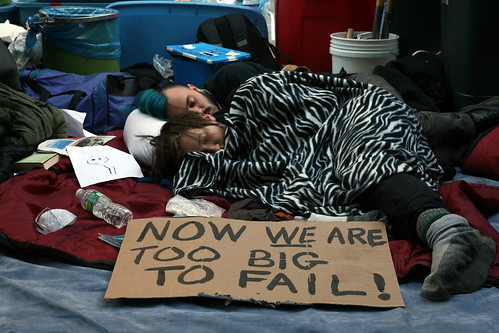
Occupy Wall Street protesters with a message that's been gaining traction.
Media outlets have steadily increased their Occupy Wall Street coverage in recent weeks – a victory in and of itself for the movement. However, most dramatic is the sudden narrative shift that has occurred at the national level as a result of this increased media coverage.
No longer are our pundits and reporters obsessed with “the deficit” and “ceilings” and incomprehensible numbers with zeros that go on ad infinitum. Instead, they are talking about popular disaffection with big banks, about personal financial struggles, about personal debt.
It’s a point Sarah Jaffe correctly noted, in passing, in a recent article on the possibility of debt strikes (a topic to which I will return):
One of the fascinating things about the media dominance of Occupy Wall Street has been how the conversation has shifted away from the deficit-obsession of the last few years. Suddenly the debt that everyone is talking about is personal, individual debt – student loans, mortgages, credit cards and other ways the big banks control our lives.
And it’s true – a national conversation is emerging as a direct result of Occupy Wall Street, a conversation about the personal ways in which we, as Americans, have been impacted by the transgressions of our largest financial institutions. The conversations we are having are now about the systemic problems in our financial sector that have brought lower- and middle-class families to their knees, as opposed to the inside-baseball wranglings that often bring Congress to theirs.
Our mainstream outlets, which do much to influence our water-cooler discussions, are not as focused these days on matters such as whether or not Obama will compromise on a debt package that contains twelve zeros (000000000000) or thirteen zeroes (000000000000000). Instead, they are focusing on the number of zeroes that families have paid to bail out our financial institutions. They are talking about the amount of zeroes representing the number of people who have moved accounts from Bank of America to credit unions. They are talking about the zeroes representing the collective debt of college students, of working teachers, of entire social sectors.
This narrative shift is not only dramatic, but profoundly important. It’s important from an electoral perspective, to be sure. But more important is the potential this narrative shift has to remake the social structure around which we have allowed our failed financial institutions to thrive.
Of course, this isn’t a new conversation – that Americans are drowning in massive debt and defaulting en masse. However, it’s a conversation that is being remade by mainstream outlets as a direct result of Occupy Wall Street. It’s a conversation revealing that people “get” why the banks have behaved criminally. They “get” how we’ve been robbed. They “get” that our personal, financial suffering is connected to profit-margins gone wild.
Americans have always gotten this.
However, the national conversation emerging due to Occupy Wall Street has given a collective voice to what we have always known. We see that we’re not alone. We see that we are among the 99 percent of citizens who have been effected. And seeing this is validation. Seeing this is evocative. Seeing this transforms our personal struggles into a collective one being given a voice and a life.
To continue this conversation, to have it reverberate on our television screens and in our coffee shops in the days ahead, Occupy Wall Street is going to have to succeed in maintaining its messaging momentum. And to do that, it will have to continue to adapt. It will have to create new avenues and vehicles capable of carrying this conversation forward.
One such idea being considered is a collective debt strike – a refusal by masses of Americans to pay back their debts to institutions that have taken advantage of them with predatory loans and exorbitant interest rates (jacked up to as high as 30 percent).
Recently, at ContactCon, a conference dedicated to solving problems related to the existence of a corporate-controlled internet, one of the winning ideas was a tool to help organize debt strikes. The man behind the idea, Thomas Gokey, an adjunct professor at Syracuse University, explained his motivation to Sarah Jaffe:
“I wanted to do this project because I kept having the same basic conversation with everyone at Zuccotti and everywhere else,” Gokey told me. “When I talk to people about what we could do that would really compel Congress and Wall Street to meet our demands or really alter the current system, we inevitably start discussing what non-cooperation with our own oppression would look like. What does it mean to stop cooperating with the banks? What we inevitably end up describing is some variation of a debt strike, simply ending our own participation in a system that exploits us.”
Ending our own participation in a system that exploits us. If such a strike – such a bold, collective act of civil disobedience – were to take hold, there is no doubt the conversation about our rejection of a corrupt financial system and the debilitating debts it has induced would be furthered.
Jaffe asks, “Are debt strikes, then, the next logical step in the fight against Big Finance’s domination of the 99 percent?”
It’s an important question we should be asking at this critical moment, the answer to which may determine how the debt narrative is carried forth in the weeks and months ahead.
So right on brother ! well said … I think more people who don”t normally follow politics are starting to get it…